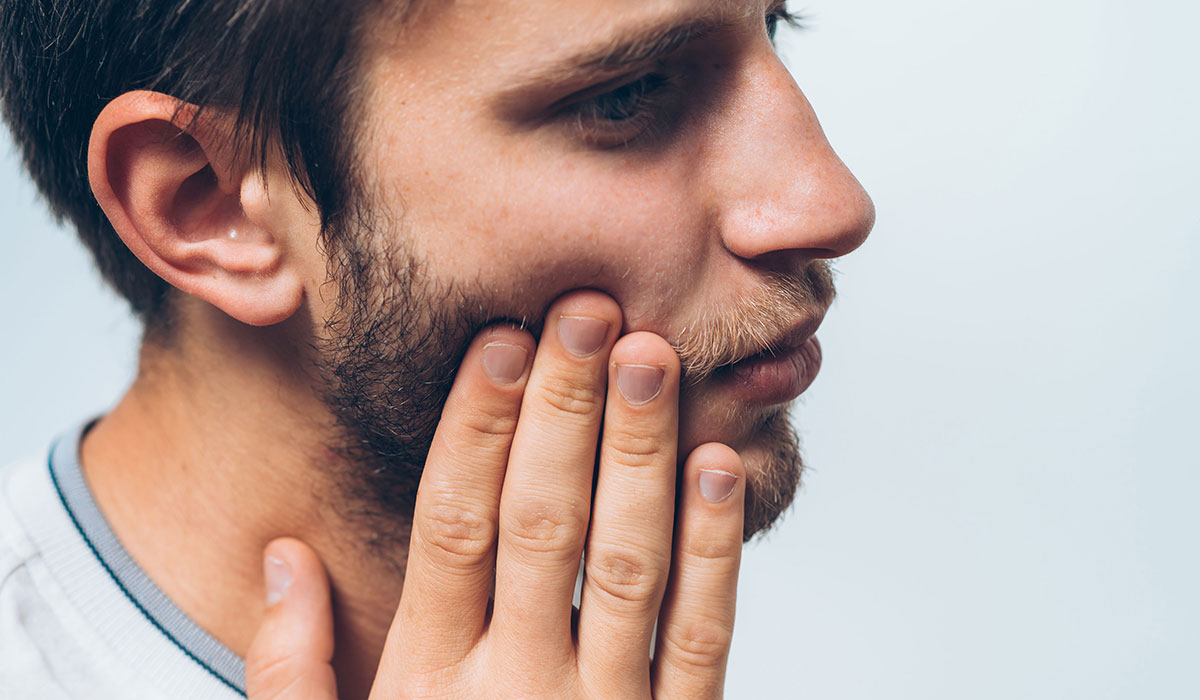
Temporomandibular Disorder
The jaw joints and groups of muscles that let us chew, swallow, speak and yawn are known as the temporomandibular. When there’s a problem with how the joints and muscles work, you may have a temporomandibular disorder or TMD.
Symptoms
The symptoms of TMDs are:
- tender or sore jaw muscles. Your jaw may be even more painful when you wake up, clench your teeth, chew your food or yawn.
- problems opening or closing your mouth. It may be hard to open or close your jaws all the way, or your jaws may lock open or closed.
- headaches that you cannot explain. You may also feel pain in your neck. These may be caused by TMD, or by other problems. Tell your dentist AND your doctor.
- a clicking or grinding noise when you chew or yawn. You may hear strange noises in your jaw joints, such as clicking or popping when you open your mouth, or crunching and grinding sounds when you chew.
Cause and Effect
The cause of TMD is not always clear, but in most cases stress is a major factor. Here are some of the things that MAY cause it:
- clenching and grinding your teeth. Clenching your jaw muscles can cause them to ache. Some people grind their teeth or clench their jaw muscles when they are under stress.
- injury to your face or jaws. Broken (or fractured) jaws, a jaw joint that has been knocked out of place (or dislocated) and “whiplash” may cause TMD.
- some diseases, such as rheumatoid arthritis, may affect the jaw joints and muscles.
- if your jaw does not grow the right way, your teeth may not line up the way they should. This can make it hard to bite and chew, and may lead to TMD.
Other things that MAY lead to TMD are:
- worn, loose, or missing teeth
- gum problems
- partial or full dentures that are not the right fit
- habits such as biting on your pen or pencil
What you can do
- Relax. Be aware of when you are clenching your teeth. Try to relax your jaw muscles and keep them relaxed. If you need help learning to relax, there are courses that can teach you. Ask your dentist or doctor.
- Watch what you eat. Stay away from hard or sticky foods. Do not chew gum. Eat a soft diet and cut food into small pieces. Try not to open your mouth too wide, even when you yawn.
- Massage and exercise. Rub (or massage) and stretch (or exercise) your jaw muscles. This may help ease stress, just like it does with other muscles in your body. But be gentle. Too much stretching or exercising could make the problem worse.
- Use a compress. Your dentist may suggest putting a cold or warm compress on your sore jaw muscles, then rubbing (or massaging) them gently to help ease tense muscles. For a cold compress, use ice cubes wrapped in a towel, or a bag of frozen vegetables such as peas. For a warm compress, use a hot water bottle or heating pad wrapped in a towel, or a hot, damp cloth.
- Remember the saying, “Lips together … teeth apart.” When you are relaxed:
- your teeth should be slightly apart,
- your tongue should be resting gently against the roof of your mouth and
- your lips should be relaxed and barely touching or slightly apart.
Try to keep your upper and lower teeth apart, except when you are eating or swallowing.
- Think positively. Almost all TMD patients get better, but there is no “easy cure.” For some patients, once they know that they clench their jaws, they make an effort to relax. They can ease their symptoms in a few days or weeks. For others, it may take several weeks or several months before they feel better.
How your dentist can help
To judge your condition, your dentist:
- will do a detailed exam, and
- may take x-rays.
Depending on what your dentist finds, he or she may suggest a plan to treat your TMD. Your dentist may also refer you to a dental specialist with extra training in TMDs. This could be an oral surgeon (also called an oral and maxillofacial surgeon), an oral pathologist, an orthodontist, a periodontist or a prosthodontist. If your dentist refers you to a dental specialist, he or she will explain what that specialist does.
Treatment may include:
- referring you to another health care worker to help you ease muscle pain or open your jaw. This could be a physiotherapist, a chiropractor and/or a behavioral therapist.
- correcting problems with your teeth. If you have a bad bite, braces or other dental work may be used to correct the problem. Teeth that are causing the problem can sometimes be reshaped to fit together better.
- taking medicine. Depending on the cause of your TMD, medicine for pain, inflammation, tense muscles or depression may help.
- wearing a night guard or bite plate (also called an occlusal splint). An occlusal splint is made of clear plastic. It fits over the biting surface of the teeth of one jaw so that you bite against the splint rather than your teeth. This helps your jaw joints and muscles to relax. Depending on your TMD, your dentist may tell you to wear a splint 24 hours a day, only at night, or for some length of time in between.
- having surgery. If none of the other treatments have worked, or if it is VERY hard to open your jaw, you MAY need surgery.



Sorry, the comment form is closed at this time.